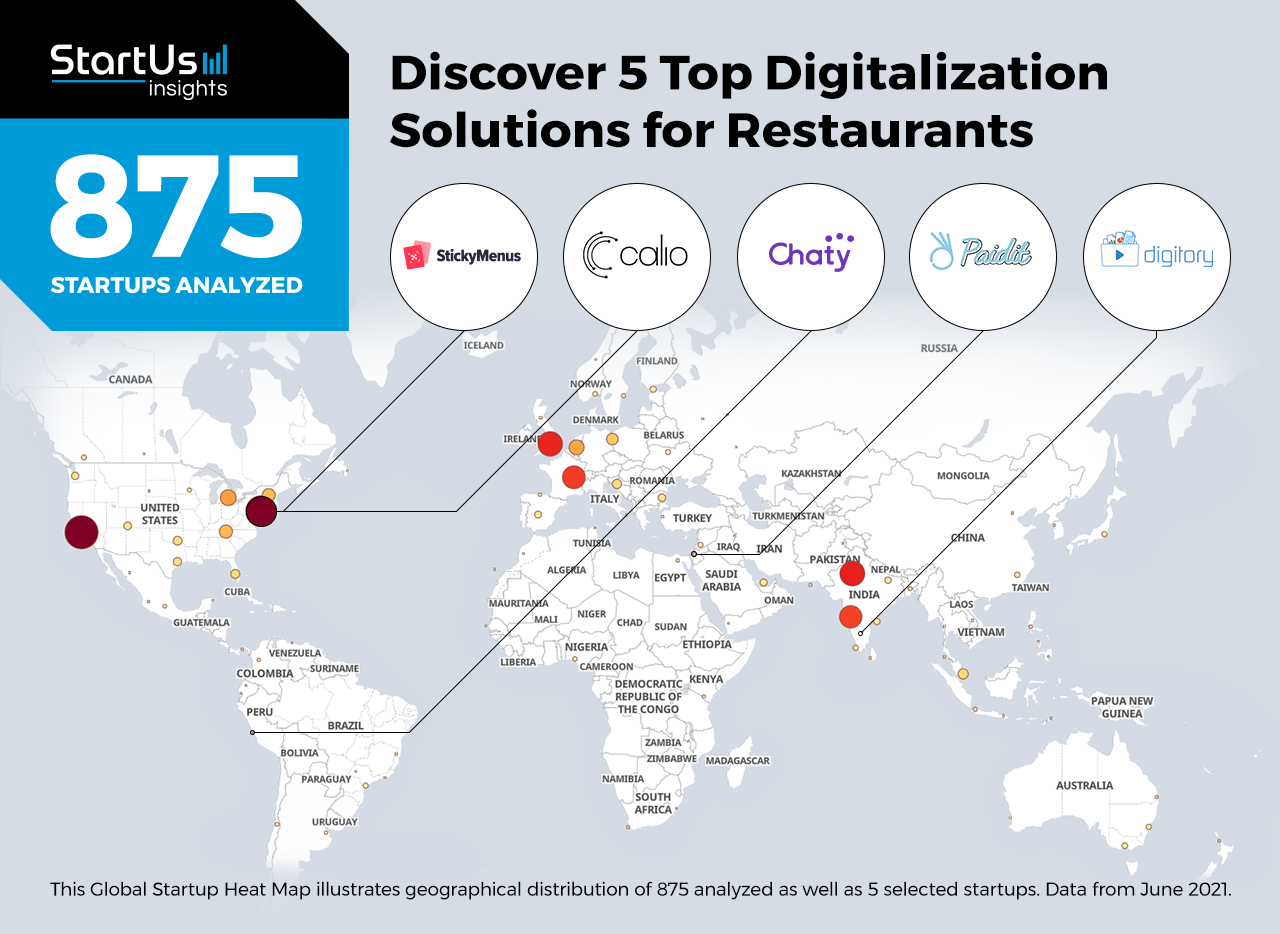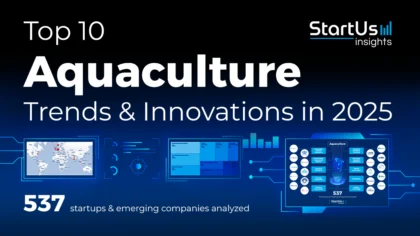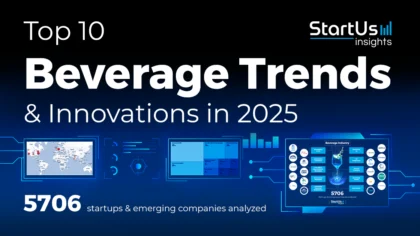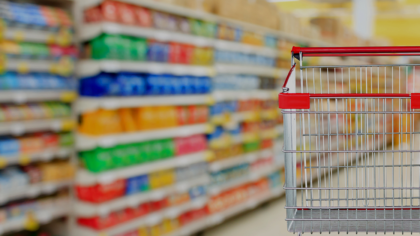Accelerate Productivity in 2025
Reignite Growth Despite the Global Slowdown
Staying ahead of the technology curve means strengthening your competitive advantage. That is why we give you data-driven innovation insights into the food industry. This time, you get to discover 5 hand-picked startups developing digitalization solutions for restaurants.
Global Startup Heat Map highlights 5 Top Digitalization Solutions for Restaurants out of 875
The insights of this data-driven analysis are derived from the Big Data & Artificial Intelligence-powered StartUs Insights Discovery Platform, covering 2.093.000+ startups & scaleups globally. The platform gives you an exhaustive overview of emerging technologies & relevant startups within a specific field in just a few clicks.
The Global Startup Heat Map below reveals the distribution of the 875 exemplary startups & scaleups we analyzed for this research. Further, it highlights 5 startups that we hand-picked based on criteria such as founding year, location, funding raised, and more. You get to explore the solutions of these 5 startups & scaleups in this report. For insights on the other 870 digitization solutions for restaurants, get in touch.
Sticky Menus designs QR Menus for Restaurants
The food and beverage (F&B) industry is shifting towards industry 4.0 with end-to-end digitization and production automation. However, the COVID-19 pandemic is making restaurants focus on implementing customer-facing digital solutions for minimal contact. These include everything from digital menus to cashless payment choices and robots to serve food. Accordingly, startups develop solutions with contactless transaction capabilities to offer a safe and hygienic experience for the customers.
Sticky Menus is a US-based startup that produces contactless QR menus for restaurants. The startup’s solution not only offers digital menus but provides contact tracing for the customers. Plus, the solution provides visitor metrics to better understand the restaurant’s customers. The startup further combines menu scheduling and dynamic menus for easy order management. In addition, the startup offers 24/7 support for restaurants.
PaidIt builds Self-Ordering Kiosks
Restaurant digitization improves the efficiency of kitchen operations and facilitates resource planning and management. Self-ordering systems like point of sale (POS) systems and kiosks at restaurants significantly reduce the order period and speed up the time until food is served. Also, they allow restaurants to save money by optimizing hospitality personnel’s resources. Similarly, digital order management solutions offer restaurant control at a single point and hence offer better visibility and flexibility.
Israeli startup PaidIt develops a digital restaurant platform that includes self-ordering kiosks as the main component. The startup’s kiosks come with a marketing engine to offer tailored promotions and advertisements to the customers. Also, the artificial intelligence backend enables menu optimization and personalization based on historical data of customers and external data points such as weather and location. In effect, the startup’s solutions improve the customer experience while food ordering and ultimately boost sales.
Calio develops a Food Ordering Management Platform
Restaurant digitization enables food providers to streamline their operations based on customer behavior and attributes. Be it the number of orders for a particular item or finding the least ordered dishes, digital management solutions allow them to make data-driven decisions. This, as well, includes effective inventory management to minimize food waste and identifying customer preferences. Startups develop digital restaurant management solutions to help food providers improve their kitchen performance.
Calio is a US-based startup that develops a device-agnostic platform to facilitate online food ordering at restaurants. The startup’s contactless smartphone app allows customers to order dishes while maintaining their personal space. The Calio Order Manager platform combines food orders from multiple channels such as POS, restaurant websites, social media, and phone orders. The startup also develops the Calio Guest Manager that allows customers to reserve tables online. Calio’s solutions help restaurant managers to optimize their operations for improved efficiency and customer satisfaction.
Chaty provides a Virtual Assistant Chatbot
Innovations in natural language processing (NLP) allow startups to develop chatbots and voice bots. Thanks to the pandemic, the importance of voice and text-enabled services are accelerating in the food industry. At restaurants, voice-enabled services to order food reduce direct contact with personnel and hence improves customer safety. Also, voice and text-enabled services allow customers unfamiliar with food ordering apps to use other channels like social media or SMS to order food.
Peruvian startup Chaty allows restaurants to accept food orders through chatbots. The startup’s virtual assistant communicates with customers instantly and takes care of food ordering. The chatbot also collects order information and passes it to the order management system. In addition, Chaty supports multiple payment options such as credit cards, debit cards, bank transfers, and more. The startup’s solution enables restaurants to automate customer interaction and improve their experience.
Digitory Solutions develops a Restaurant Management Software
Inventory wastage is a critical concern in restaurant operational expenses. This is due to uninformed decisions and a lack of customer intelligence. However, restaurant digitization imparts digital touchpoints into restaurant workflows from procurement to serving food at the table. This improved visibility enables food providers better understand their operations through data points at each level. That is why startups focus on supply chain management and restaurant management solutions.
Indian startup Digitory Solutions offers restaurant management software with integrated inventory, back-office automation, and intelligence. The startup uses machine learning to forecast sales and optimize procurement. In addition, it develops a POS and order management system that further improves the prediction models. The startup’s solutions offer enhanced visibility into restaurant supply chains as well as reduce inventory costs.
Discover more Food Tech Startups
Food tech startups such as the examples highlighted in this report focus on robotics, 3D food printing, alternative proteins as well as personalized nutrition. While all of these technologies play a major role in advancing the food industry, they only represent the tip of the iceberg. To explore more food technologies, simply get in touch to let us look into your areas of interest. For a more general overview, you can download our free Food Innovation Report to save your time and improve strategic decision-making.








